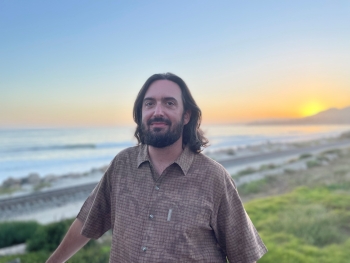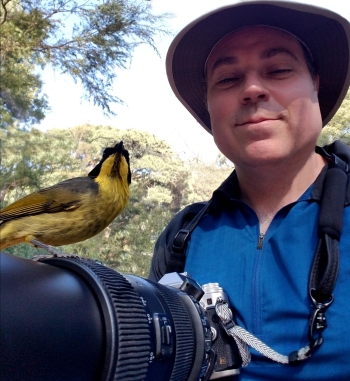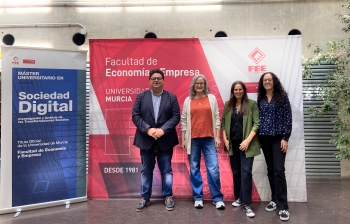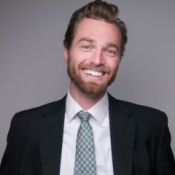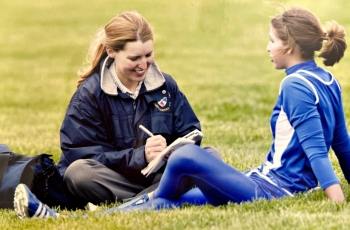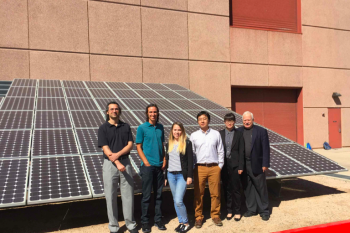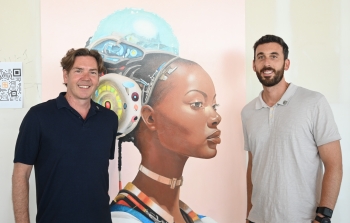9 ASU faculty receive Fulbright US Scholar awards for 2024–25

The Fulbright U.S. Scholar Program awarded nine ASU faculty members for the 2024–25 academic year. Photo by Deanna Dent/ASU
Using AI to optimize rooftop solar panels in North Macedonia. Charting immigration and human rights efforts in Spain and Morocco. Improving health-records data systems in Uganda.
These projects and more will be undertaken over the 2024–25 academic year by nine Arizona State University faculty members who have received Fulbright U.S. Scholar Program awards from the U.S. Department of State and the Fulbright Foreign Scholarship Board.
Fulbright U.S. Scholars teach or conduct research in affiliation with institutes abroad, often continuing research collaborations started abroad and laying the groundwork for forging future partnerships between institutions. Over 800 individuals take part annually.
The new ASU awardees (with the destination named in the award in parentheses) are:
Support for those who wish to apply
The ASU Fulbright Office offers a variety of comprehensive resources to support applications to the Fulbright Scholars and Specialist programs, including consultations, application reviews and resource guides. ASU faculty interested in applying to the U.S. Fulbright Scholars Program should contact Karen Engler-Weber, ASU’s Fulbright liaison, to get connected.
Applications for the 2025–26 competition are due Sept. 16.
- David Androff (Morocco-Spain Joint Teaching/Research Award), Watts College of Public Service and Community Solutions.
- Aaron Fellmeth (Australia), Sandra Day O’Connor College of Law.
- Nilda Flores-González (Spain), T. Denny Sanford School of Social and Family Dynamics.
- Lee Voth-Gaeddert (Guatemala), Biodesign Center for Health Through Microbiomes.
- Stuart Newfeld (Estonia), School of Life Sciences.
- Sada Reed (Denmark), Walter Cronkite School of Journalism and Mass Communication.
- Andreas Spanias (North Macedonia), Ira A. Fulton School of Engineering.
- Chad Stecher (Uganda), College of Health Solutions.
- Karen Taliaferro (Morocco), formerly of the School of Civic and Economic Thought and Leadership, now faculty at the University of Florida.
“On behalf of the entire academic community, I extend my sincere congratulations to our newest cohort of Fulbright Scholars,” said Nancy Gonzales, executive vice president and university provost.
“These scholars represent what makes ASU faculty members exceptional — their commitment to advancing their fields of study while applying their research to the design of positive solutions for communities around the world. The diverse range of disciplines represented by this year’s Fulbright Scholars Program highlights the breadth of faculty excellence at ASU and the university’s dedication to celebrating it.”
ASU student Fulbrights
Fourteen ASU students have been awarded Fulbright scholarships for 2024–25 academic year.
Fulbright is a program of the U.S. Department of State, and it operates in over 160 countries worldwide. Since 1946, the Fulbright program has provided over 400,000 students, scholars and professionals of all backgrounds with the opportunity to study, teach and conduct research abroad. Notable Fulbrighters include 62 Nobel laureates, 89 Pulitzer Prize winners, 80 MacArthur Fellows, 41 heads of state or government, and thousands of leaders across the private, public and nonprofit sectors.
Keep reading to learn what some of the ASU awardees will be working on in the coming academic year.
Migration route between Morocco and Spain
David Androff is a professor in the School of Social Work, part of the Watts College of Public Service and Community Solutions. His research focuses on building strong and sustainable communities through promoting human rights and making connections to social work, refugee empowerment, immigration policy and human trafficking.
Androff will spend 10 months researching social services for migrants in Morocco and Spain. (His appointment to two countries, which begins in September, is rare; most Fulbrights are assigned to only one.) During his appointment, Androff will be able to directly observe each country’s approach to migration.
In Morocco, he will be hosted by the Political Studies and Public Law Research Laboratory at Sidi Mohamed Ben Abdellah University in Fez. Androff said Morocco is both a transit and destination country for African migrants, building upon a culture of hospitality to develop the most advanced immigration policy and integration programs in North Africa.
In Spain, Androff will be hosted by the Institute of Migration Research at the University of Granada. He said Spain is more inclusive than many other European Union nations, with an intercultural approach to immigration policy and services that is in tension with its role as an EU border state.
“Morocco and Spain are connected by history, culture and are a global flashpoint for migration. Both countries are laboratories of integration,” Androff said. “I will study what social workers are doing on both sides of the border for migrants.”
International human rights law and firearms
Aaron Fellmeth is the Dennis S. Karjala Professor of Law, Science and Technology at the Sandra Day O'Connor College of Law. A leading expert in public international law, international business transactions and intellectual property law, his research focuses on international trade law, human rights and more. He sits on the board of directors of the International Law Association's American branch and chairs its international human rights committee. He began teaching law at ASU in 2004 after seven years of practicing international law.
He will spend five months as a resident at the Jeff Bleich Centre for Democracy and Disruptive Technologies at Flinders University in Adelaide, Australia — the perfect place for his research, he said.
“As an international lawyer, the subject of my research and scholarship is naturally global,” Fellmeth said. “The project sponsored by the Fulbright Foundation is a study on the relationship between international human rights law and firearms, and potential solutions to the entrenched problem of private gun violence in many countries, including the United States. Australia is an especially good base for research on this subject because of its success in drastically reducing gun violence and accidents by decisive policy measures. It is also the home of many accomplished scholars in international law, human rights, firearms regulation and public health, all of which relate to my project.”
The social and political identities of young Latin Americans in Spain
Nilda Flores-González, an associate director of sociology in the T. Denny Sanford School of Social and Family Dynamics, will spend three months in Spain collaborating with colleagues at the University of Murcia. Her research will focus on immigration and national identity, exploring how young adults of Latin American origin navigate and integrate into Spanish society.
Drawing on her previous work investigating national belonging among Arizona youth, Flores-González will take a comparative approach with the Murcia Youth Identity Project. Over three months of interviews from January to March of 2025, her research will explore how factors like race, ethnicity, socioeconomic background and gender shape the social and political identities of young Latin Americans. Similar to her previous research, the project will use photovoice, a method where participants use photographs and visuals to express, document and reflect on their perspectives and concerns.
By comparing her research in Spain with her work in the United States, Flores-González aims to uncover the unique challenges and experiences faced by these youth in different cultural contexts. Her research seeks to deepen our understanding of immigrant integration and foster meaningful conversations about what it means to “belong” in a country.
Mitigating environmental pathogen exposures among children
Lee Voth-Gaeddert is an assistant research professor with the Biodesign Center for Health Through Microbiomes and a senior Global Futures scientist with the Julie Ann Wrigley Global Futures Laboratory.
Voth-Gaeddert has over a decade of experience addressing global challenges in water, sanitation, antimicrobial resistance, food security and public health, in concert with various U.S. government agencies and U.N. entities. He is an environmental engineer, U.S. registered sanitarian, systems engineer and certified emergency responder, working in over 10 countries in North and Latin America, Sub-Saharan Africa and Asia. His work includes participating in hurricane recovery missions in the Caribbean, addressing food insecurity in Central America and tackling transboundary animal diseases in Southeast Asia.
For this Fulbright, Voth-Gaeddert will be working with the Center for Indigenous Health Research at Maya Health Alliance and their Indigenous partner communities in Guatemala to better understand and mitigate environmental pathogen exposures among young children.
“Having had the opportunity to work and live in Guatemala as a U.S. Peace Corps volunteer, I am excited to leverage this U.S. Fulbright award to continue to expand our support and co-learn with local leaders about ways we can sustainably address chronic malnutrition challenges in Guatemala,” he says.
Guatemala has one of the highest rates of chronic malnutrition, globally, with about 45% of children under 5 years old chronically malnourished. Maya Health Alliance is a local clinical care and research organization, providing evidence-based health care services to underserved Indigenous communities in the country.
Analyzing and teaching sports and globalization
Sada Reed, a veteran sports reporter and editor whose research intersects sports journalism practice, pedagogy and quantitative methods, will work at Aarhus University in Denmark, teaching and conducting research during the 2024–25 academic year to fulfill her Fulbright opportunity.
Reed, who was recently promoted to associate professor with tenure, will perform a content analysis on abstracts accepted by the Play the Game conference within the past 10 years. Play the Game is an initiative run by the Danish Institute for Sports Studies and is a platform for sports stakeholders to share their research and debate key issues plaguing sports around the globe.
Reed will also co-teach a master’s-level sport and globalization class with professors and prominent Play the Game contributors Kirsten Frandsen and Jörg Krieger. In addition, she will study Danish pedagogical traditions that emphasize small-group learning.
Using AI to optimize rooftop solar energy system performance
Andreas Spanias is a professor of electrical engineering in the Ira A. Fulton Schools of Engineering. He is also a fellow of the Institute of Electrical and Electronics Engineers and the director for the Sensor, Signal and Information Processing Center and industry consortium, which was established with National Science Foundation Industry-University Cooperative Research Centers program support. Spanias’ research focuses on signal processing and machine learning algorithms with applications in sensors, speech and energy systems. He also explores machine learning simulations for quantum computing technology.
Spanias will work with electrical engineering and information technology faculty members at the Saints Cyril and Methodius University in Skopje, North Macedonia, to develop and deploy machine learning and artificial intelligence algorithms to optimize rooftop solar energy system performance. The AI algorithms will aim to detect system faults and use sensors for measuring solar irradiance as well as electrical and weather parameters to optimize solar power production.
The project will also include seminars and outreach in the Balkans region of Europe to encourage education and research in solar energy systems by scientists and university students.
A secure solution for accessing hospital data
Chad Stecher is a behavioral health economist and assistant professor in the science of health care delivery, biomedical informatics, and exercise and nutritional sciences programs at the College of Health Solutions. Last year he took part in the art exhibition “Artist + Researcher 2023,” where he teamed up with local artist James Angell to present “Future Health Outcomes: The Rise of Experimental Behavior Health Economics,” where his work involving wearable devices was paired with Angell’s AI-enhanced images.
For his Fulbright project, Stecher will be involved in a six-month project to clean, organize and begin conducting research using the electronic health-records (EHR) data that has been recorded at the Mildmay Uganda Hospital over the past nine years. He will also lead data science trainings for hospital staff and researchers with the goal of assisting Mildmay personnel in the completion of their own research and grant writing using the EHR data.
The project will produce a secure solution for remotely accessing the hospital’s EHR data, provide readily accessible data science educational materials for future Mildmay researchers and enhance the stability of Mildmay’s research program.
Richard Harth, Weldon Johnson, Jennifer Moore, Mark Scarp, TJ Triolo, Lindsay Walker and Jamar Younger contributed to this story.
More University news

Miki Kittilson appointed dean of ASU's College of Global Futures
Miki Kittilson has been appointed dean of Arizona State University’s College of Global Futures, a unit of the Julie Ann Wrigley Global Futures Laboratory.“As we enter this next phase of…
Graduate College celebrates 2024–25 Outstanding Faculty Mentors
Each year, Arizona State University’s Graduate College celebrates faculty members who have demonstrated an unwavering commitment to mentoring and supporting graduate students and postdoctoral…

ASU's building boom illustrates university's commitment to keep moving forward
To understand how Arizona State University is never settling and constantly improving, look up.At the seven-story student housing complex being built near Mill Avenue in Tempe.At the…
